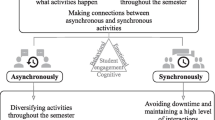Abstract
This paper is a response to Maria Andree’s paper. Andree tells in the paper how mistakes in practical lessons may be critical events to change students’ attitudes in regard science. While traditionally mistakes in practical lessons could obligate students to repeat the experiment in order to get the ‘right result’ in the paper we have a good example how we can use the incident to potentiate students’ participation. In my response I illustrate how transferable is what Andree speaks about but I put forward further reflections about the traditions that may act as impediment for students’ participation. I thus suggest that the critical paradigm should be a component in reflecting about science classroom practices in order to alter the traditions.
Similar content being viewed by others
References
Aalsvoort, J. V. (2004). Logical positivism as a tool to analyse the problem of chemistry’s lack of relevance in secondary school chemical education. International Journal of Science Education, 26, 1151–1168.
Abd-El-Khalick, F. (2005). Developing deeper understanding of nature of science: The impact of a philosophy of science course on preservice science teachers’ views and instructional planning. International Journal of Science Education, 27, 15–42.
Afonso, E. (2007). Developing culturally inclusive philosophy of science teacher education in Mozambique. Unpublished PhD thesis, Curtin University, Perth.
Andrée, M. (2012). Altering conditions for student participation and motive development in school science: learning from Helena’s mistake. Cultural Studies of Science Education, 7. doi:10.1007/s11422-011-9314-x.
Cohen, L., Manion, L., & Morrison, K. (2007). Research methods in education (6th ed.). London: Routlege.
Guba, E., & Lincoln, Y. (1989). Fourth generation evaluation. London: SAGE Publications.
Kincheloe, J. L., & McLaren, P. (2002). Rethinking critical theory and qualitative research. In Y. Zou & E. Trueba (Eds.), Ethnography and schools (pp. 87–138). Maryland: Rowman & Littlefield publish.
Milne, C. E. (1997). Science cultural myths and school science: A critical analysis of historical and contemporary discourses. Unpublished PhD thesis, Curtin University, Perth.
Taylor, P. C. (2008). Multi-paradigmatic research design spaces for cultural studies researchers embodying postcolonial theorizing. Cultural Studies of Science Education, 3, 881–890.
Author information
Authors and Affiliations
Corresponding author
Additional information
This is a review essay of: Andrée (2012).
Rights and permissions
About this article
Cite this article
Nhalevilo, E.A. Chemistry practical lessons: altering traditions for students’ emancipation. Cult Stud of Sci Educ 7, 447–450 (2012). https://doi.org/10.1007/s11422-012-9377-3
Received:
Accepted:
Published:
Issue Date:
DOI: https://doi.org/10.1007/s11422-012-9377-3




